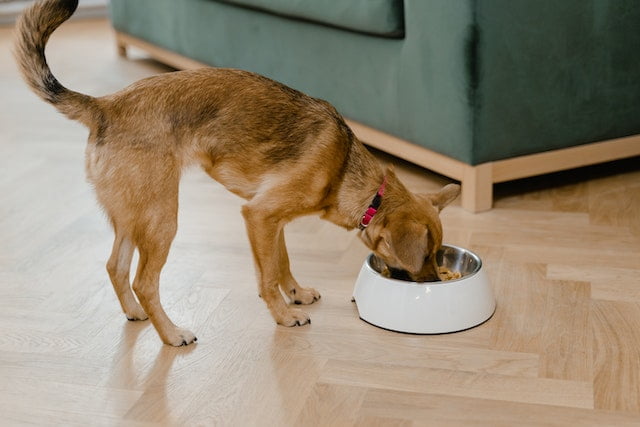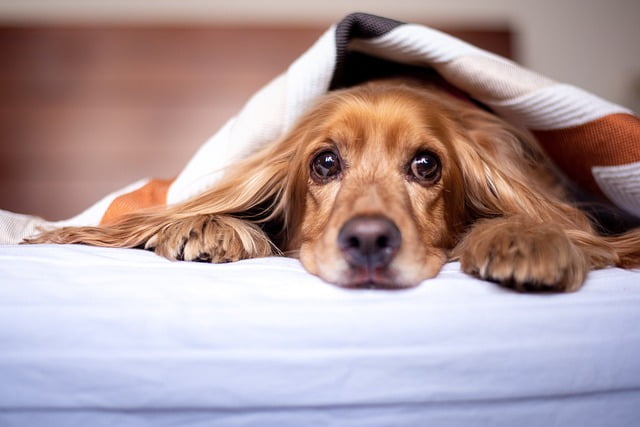Best time to feed dogs so they don’t poop at night (2024)
Are you tired of dealing with those unpleasant nighttime accidents with your dog? If you’re searching for the best time to feed dogs so they don’t poop at night, you’ve come to the right place. Establishing a proper feeding schedule is crucial for regulating your dog’s digestive system and minimizing those unwanted surprises during bedtime. In this Pawsitive Tips, we will delve into the ideal feeding times that will help you and your canine companion enjoy uninterrupted nights of sleep. Say goodbye to midnight clean-ups and discover the secrets to keeping your dog’s bathroom habits in check. Let’s explore the best strategies to ensure a peaceful and mess-free sleep for both you and your beloved pet.
Related articles:
What is the best time to feed dogs so they don’t poop at night?
The best time to feed dogs so they don’t poop at night is to feed them in the morning and early evening, allowing ample time for digestion before bedtime.
Feeding your dog in the morning, preferably around the same time as your breakfast, kick-starts their metabolism and gives them energy for the day. Their evening meal should be served at least three to four hours before bedtime to ensure proper digestion and minimize the likelihood of nighttime bathroom breaks. Establishing a consistent feeding schedule and avoiding late-night snacks or treats further helps in preventing nighttime pooping.
Understanding the Dog’s Digestive System
To determine the best time to feed your dog, it’s essential to have a basic understanding of their digestive system. Dogs, like humans, have their own internal clocks, and their bodies function optimally when following a regular routine. By establishing consistency in their feeding schedule, you help regulate their bodily functions, including bowel movements.
The Importance of Consistency
Consistency is key when it comes to setting a feeding schedule for your furry companion. Dogs thrive on predictability, and a consistent routine helps their bodies adapt and function efficiently. By feeding your dog at the same times each day, you create a sense of stability, which can have a positive impact on their digestion and overall well-being.
Morning Feeding
Kick-starting the Day: Like we mentioned earlier, one of the best times to feed your dog is in the morning, ideally around the same time you have your own breakfast. This early meal provides your dog with the necessary energy to start the day and stimulates their metabolism. By feeding them early on, you allow sufficient time for digestion before bedtime, reducing the likelihood of nighttime accidents.
Midday Meal
Maintaining Energy Levels: If your schedule allows, providing a midday meal for your dog can help maintain their energy levels throughout the day. This can be particularly beneficial for active breeds or dogs with higher energy requirements. However, it’s important to consider your dog’s specific needs, such as breed, age, and activity level, when determining the portion size and frequency of their midday meal.
Evening Feeding
Timing Is Key: The timing of your dog’s evening meal is crucial to preventing nighttime accidents. Ideally, you should aim to feed them their dinner at least three to four hours before bedtime. This allows ample time for digestion and ensures that their system has processed the food before settling down for the night. By giving their body enough time to process the meal, you reduce the chances of late-night potty breaks.
Avoid Late-Night Snacks
Although occasional treats may be harmless, providing late-night snacks can disrupt your dog’s sleep schedule and lead to unwanted accidents. It’s best to avoid feeding your dog close to their bedtime. Stick to the recommended feeding times and resist the temptation to give in to their adorable puppy-dog eyes when the clock strikes late.
Create a Bedtime Routine
Establishing a consistent bedtime routine is beneficial not only for your dog’s bathroom habits but also for their overall well-being. Set a specific time for their final bathroom break before settling down for the night. This routine helps them associate the last trip outside with preparing for sleep, reducing the likelihood of nighttime accidents.
Related articles:
- 9 Mistakes to Avoid When Choosing a Bed for Your Dog
- My puppy won’t sleep unless next to me. What do I do?
Frequently Asked Questions
What time should I stop feeding my dog at night?
It is recommended to stop feeding your dog at least three to four hours before their bedtime.
How do I get my dog to stop pooping at night?
To get your dog to stop pooping at night:
- Establish a consistent routine for feeding, exercise, and bathroom breaks.
- Adjust feeding times, avoiding late meals close to bedtime.
- Monitor water intake, limiting access before nighttime.
- Provide a final bathroom break before bed.
- Consider crate training or confining your dog to a designated area at night.
- Consult with a veterinarian if the issue persists for personalized advice and guidance.
Can a dog go all night without pooping?
Yes, it is possible for a dog to go all night without pooping. Dogs have different bowel movement patterns, and some may not need to eliminate during the night if they have properly emptied their bowels before bedtime. However, this can vary depending on the individual dog, their diet, age, and overall health.
Why can’t my dog hold her poop at night?
There could be several reasons why your dog is unable to hold her poop at night:
- Digestive Issues: Your dog may have an underlying digestive problem, such as an upset stomach, food intolerance, or gastrointestinal disorder, which can cause urgency and make it challenging to hold poop.
- Inadequate Training: Insufficient or ineffective potty training may be a factor. If your dog hasn’t been properly trained to control their bowel movements or signal their need to go outside, accidents at night may occur.
- Medical Conditions: Certain medical conditions, such as irritable bowel syndrome, inflammatory bowel disease, or an infection, can affect your dog’s bowel control and cause nighttime accidents.
- Age or seniority: Older dogs or those with weakened muscles due to age or certain health conditions may struggle to hold their poop as effectively as younger dogs.
If your dog consistently struggles to hold her poop at night, it’s recommended to consult with a veterinarian.
Can dogs eat at 11pm?
Yes, dogs can eat at 11 p.m.The specific feeding schedule for your dog may depend on their individual needs and routine. However, as long as it aligns with their regular feeding schedule and allows sufficient time for digestion before bedtime, feeding them at 11 p.m. should not pose a problem.
Conclusion
In conclusion to the topic “Best time to feed dogs so they don’t poop at night”, feed your dog in the morning to kick-start their day, provide a midday meal if needed, and ensure their evening meal is given ample time for digestion. Avoid late-night snacks and create a bedtime routine that prepares your dog for a restful night’s sleep. With these strategies in place, you can bid farewell to midnight clean-ups and enjoy uninterrupted nights with your beloved furry companion.



